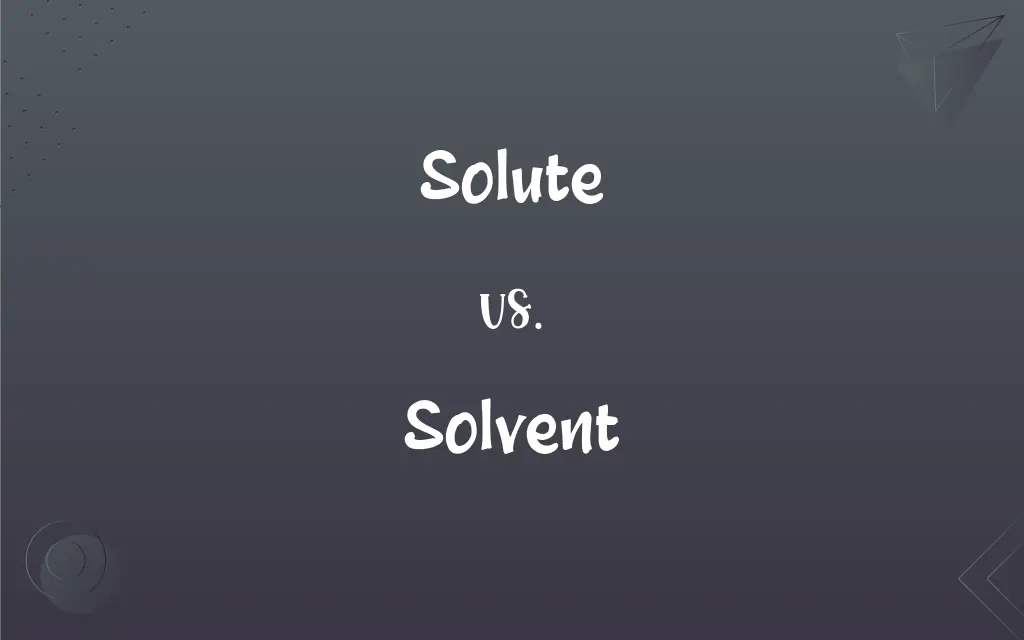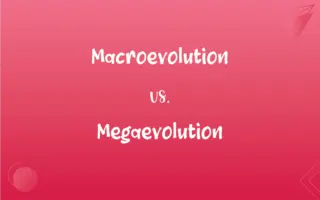Solute vs. Solvent: What's the Difference?
Edited by Aimie Carlson || By Harlon Moss || Updated on October 26, 2023
A solute is the substance that is dissolved, while a solvent is the substance in which the solute dissolves.

Key Differences
A solute and a solvent are both key components in the process of dissolution. The solute is the component that gets dissolved, while the solvent is the medium in which this dissolution takes place.
When considering a sugar and water mixture, sugar acts as the solute because it is the substance that gets dissolved. On the other hand, water acts as the solvent because it is the substance doing the dissolving.
The amount of solute that can be dissolved in a specific solvent at a given temperature defines the solution's solubility. The solvent's capacity to dissolve a solute varies depending on factors like temperature and pressure.
Both solute and solvent play a crucial role in determining the properties of a solution. The concentration of the solute in the solvent will influence characteristics such as boiling point, freezing point, and osmotic pressure.
In the world of chemistry, understanding the roles of both solute and solvent is essential. While the solute typically determines the nature of the solution, the solvent often dictates the amount of solute that can be dissolved.
ADVERTISEMENT
Comparison Chart
Definition
Substance that is dissolved.
Medium in which a solute dissolves.
Role in a Solution
Determines the nature of the solution.
Dictates the amount of solute that can dissolve.
Example
Sugar in a sugar-water solution.
Water in a sugar-water solution.
Concentration Impact
Influences properties like osmotic pressure.
Determines solubility limits of the solute.
Dependency
Depends on solvent for dissolution.
Can dissolve various solutes.
ADVERTISEMENT
Solute and Solvent Definitions
Solute
An ingredient that loses its original form in a mixture.
When making lemonade, sugar is the solute that dissolves in water.
Solvent
A liquid in which substances (solutes) can be dissolved.
Acetone is a solvent used to remove nail polish.
Solute
The component present in a lesser amount in a solution.
In a solution of water and ethanol, if ethanol is less, it acts as the solute.
Solvent
A medium that facilitates the distribution of solute particles.
Alcohol is a common solvent in many medicinal tinctures.
Solute
The part of a solution that gets integrated into the solvent.
In a brass alloy, zinc is the solute in copper.
Solvent
The phase that remains continuous in a solution.
In a gaseous mixture of helium and air, air acts as the solvent.
Solute
The matter that changes phase in a solution.
In a gaseous solution of air, oxygen can be seen as a solute.
Solvent
The major component of a solution that dissolves other substances.
In seawater, water is the primary solvent dissolving various salts.
Solute
A substance that becomes dissolved in a liquid.
Salt is a solute when mixed with water.
Solvent
A substance responsible for altering the phase of another substance.
In paint thinners, turpentine is the solvent thinning the paint.
Solute
A substance dissolved in another substance, usually the component of a solution present in the lesser amount.
Solvent
Capable of meeting financial obligations.
FAQs
What is a solvent?
A solvent is the substance in which the solute is dissolved to form a solution.
Can a substance be both solute and solvent in different situations?
Yes, for instance, when alcohol is mixed with water, it can be considered as both solute (when present in lesser amount) and solvent (when in greater amount).
Is water always a solvent?
While water is a common solvent in many solutions, it can also act as a solute. For example, in a solution of water in ethanol, water is the solute.
What determines the solubility of a solute in a given solvent?
Solubility is influenced by factors like temperature, pressure, the nature of the solute and solvent, and their interactions.
Can a solute be a liquid?
Yes, a solute can be a solid, liquid, or gas. For instance, in a solution of alcohol in water, alcohol is the solute.
What is a solute?
A solute is a substance that is dissolved in another substance, forming a solution.
What is meant by "like dissolves like"?
It's a principle stating that substances with similar chemical properties (e.g., polarities) tend to dissolve in each other.
What role does temperature play in solubility?
For most solids, solubility increases with temperature, but for gases, solubility usually decreases as temperature rises.
What is a universal solvent?
Water is often called a "universal solvent" because of its ability to dissolve a wide variety of substances.
How do solutes affect boiling and freezing points?
Solutes generally elevate boiling points and depress freezing points of solvents.
Why do some solutes not dissolve in certain solvents?
Not all solutes dissolve in all solvents because of differences in molecular interactions. For instance, polar solutes often dissolve in polar solvents but not in nonpolar ones.
What is a supersaturated solution?
It's a solution that contains more solute than it can theoretically hold at a given temperature.
What does "aqueous solution" mean?
An aqueous solution is a solution in which water acts as the solvent.
What is molarity?
Molarity (M) is a measure of solute concentration, defined as the number of moles of solute per liter of solution.
What's the difference between a solvent and a solute in terms of function?
The solute is the substance that gets dissolved, while the solvent is the substance that does the dissolving.
Can a gas be a solute?
Yes, gases can be solutes. For example, oxygen is a solute when it's dissolved in water.
Can a solute and solvent be separated?
Yes, through methods like evaporation, crystallization, distillation, or chromatography.
Is a solute always present in lesser amounts than the solvent?
Generally, yes. But in concentrated solutions, the amounts might be comparable.
What happens when maximum solubility is reached?
Any additional solute added won't dissolve and might precipitate or remain undissolved.
What is a miscible fluid?
Miscible fluids are liquids that can be mixed together in any ratio without separating into two phases. For instance, water and ethanol are miscible.
About Author
Written by
Harlon MossHarlon is a seasoned quality moderator and accomplished content writer for Difference Wiki. An alumnus of the prestigious University of California, he earned his degree in Computer Science. Leveraging his academic background, Harlon brings a meticulous and informed perspective to his work, ensuring content accuracy and excellence.
Edited by
Aimie CarlsonAimie Carlson, holding a master's degree in English literature, is a fervent English language enthusiast. She lends her writing talents to Difference Wiki, a prominent website that specializes in comparisons, offering readers insightful analyses that both captivate and inform.































































